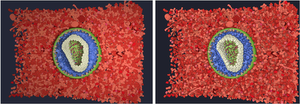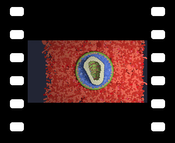Information
- Publication Type: Journal Paper with Conference Talk
- Workgroup(s)/Project(s):
- Date: September 2018
- Journal: Eurographics Workshop on Visual Computing for Biology and Medicine
- Call for Papers: Call for Paper
- Conference date: September 2018
Abstract
Visual clutter is a major problem in large biological data visualization. It is often addressed through the means of level of detail schemes coupled with an appropriate coloring of the visualized structures. Ambient occlusion and shadows are often used to improve the depth perception. However, when used excessively, these techniques are sources of visual clutter themselves. In this paper we present a new approach to screen-space illumination algorithms suitable for use in illustrative visualization. The illumination effect can be controlled so that desired levels of semantic scene organization cast shadows while other remain flat. This way the illumination design can be parameterized to keep visual clutter, originating from illumination, to a minimum, while also guiding the user in a multiscale model exploration. We achieve this by selectively applying occlusion shading based on the inherent semantics of the visualized hierarchically-organized data. The technique is in principle generally applicable to any hierarchically organized 3D scene and has been demonstrated on an exemplary scene from integrative structural biology.Additional Files and Images
Weblinks
No further information available.BibTeX
@article{koch_bernhard_2018-1,
title = "Semantic Screen-Space Occlusion for Multiscale Molecular
Visualization",
author = "Thomas Bernhard Koch and David Kou\v{r}il and Tobias Klein
and Peter Mindek and Ivan Viola",
year = "2018",
abstract = "Visual clutter is a major problem in large biological data
visualization. It is often addressed through the means of
level of detail schemes coupled with an appropriate coloring
of the visualized structures. Ambient occlusion and shadows
are often used to improve the depth perception. However,
when used excessively, these techniques are sources of
visual clutter themselves. In this paper we present a new
approach to screen-space illumination algorithms suitable
for use in illustrative visualization. The illumination
effect can be controlled so that desired levels of semantic
scene organization cast shadows while other remain flat.
This way the illumination design can be parameterized to
keep visual clutter, originating from illumination, to a
minimum, while also guiding the user in a multiscale model
exploration. We achieve this by selectively applying
occlusion shading based on the inherent semantics of the
visualized hierarchically-organized data. The technique is
in principle generally applicable to any hierarchically
organized 3D scene and has been demonstrated on an exemplary
scene from integrative structural biology. ",
month = sep,
journal = "Eurographics Workshop on Visual Computing for Biology and
Medicine",
URL = "https://www.cg.tuwien.ac.at/research/publications/2018/koch_bernhard_2018-1/",
}


 paper
paper

